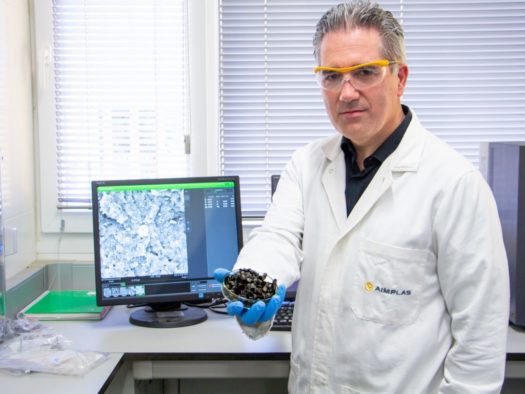
AIMPLAS has completed its participation as coordinator of the European GRAMOFON Project, which has developed an innovative CO2 capture process based on novel nanomaterials and microwave energy. The project results therefore contribute to Sustainable Development Goal 13 on Climate Action of the UN Global Compact through decarbonization with the major advantage of doing so at a lower cost than the technologies currently in use.
During the 42-month project, innovative materials and efficient systems for capturing CO2 from post-combustion industrial emissions were developed. In particular, materials such as modified-graphene aerogels and metal-organic frameworks (MOFs) have shown very good CO2 capture capacities and greater selectivity than traditional adsorbents.
The distinctive feature of these materials is their special ability to absorb microwave radiation, which has made it possible to develop a microwave heating system to help desorb the captured CO2 with low energy cost compared to more traditional heating options that are still widely used.
In the final stage of the project, additional favourable properties of these adsorbent materials were also found, including their catalytic activity. Their use as catalysts in the synthesis of high value-added chemical products such as fuels, alcohols, carbonates and polyurethanes will make it possible to reduce the amount of CO2 currently generated. The knowledge gained on CO2 adsorbents during the project presents a number of promising options for the implementation of these effective new systems to significantly reduce CO2 emissions in industrial plants.

Consortium and funding
The project boasted a budget of €4.2 million and a total of nine partners (companies, technology centres and universities). Implemented in cooperation with South Korea, It was funded by the European Union Horizon 2020 research and innovation programme under grant agreement number 727619. Coordinated by AIMPLAS, the project also involved the CNRS (France), University of Mons (Belgium), Fraunhofer ICT (Germany), Graphenea (Spain), Process Design Centre (the Netherlands), e2v (United Kingdom), MOFTech (United Kingdom), and KRICT (South Korea).
Source
AIMPLAS, press release, 2020-04-30.
Supplier
AIMPLAS (Asociación de Investigación de Materiales Plásticos y Conexas)
Fraunhofer-Institut für Chemische Technologie (ICT)
Horizon 2020
Share
Renewable Carbon News – Daily Newsletter
Subscribe to our daily email newsletter – the world's leading newsletter on renewable materials and chemicals












